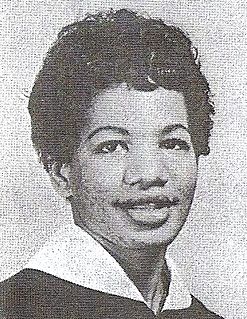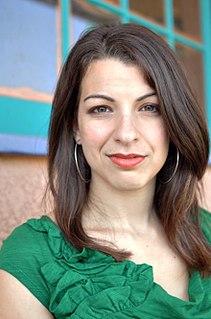Related Research Articles

The École Polytechnique massacre, also known as the Montreal massacre, was a mass shooting in Montreal at an engineering school affiliated with the Université de Montréal. 14 women were murdered and 10 women and four men were injured.

Gloria Jean Watkins, better known by her pen name bell hooks, is an American author, professor, feminist, and social activist. The name "bell hooks" is borrowed from her maternal great-grandmother, Bell Blair Hooks.

Radcliffe College was a women's liberal arts college in Cambridge, Massachusetts, and functioned as the female coordinate institution for the all-male Harvard College. It was one of the Seven Sisters colleges and held the popular reputation of having a particularly intellectual, literary, and independent-minded female student body. Radcliffe conferred Radcliffe College diplomas to undergraduates and graduate students for approximately the first 70 years of its history and then joint Harvard-Radcliffe diplomas to undergraduates beginning in 1963. A formal "non-merger merger" agreement with Harvard was signed in 1977, with full integration with Harvard completed in 1999. Today, within Harvard University, Radcliffe's former administrative campus is home to the Radcliffe Institute for Advanced Study, and former Radcliffe housing at the Radcliffe Quadrangle has been incorporated into the Harvard College house system. Under the terms of the 1999 consolidation, the Radcliffe Yard and the Radcliffe Quadrangle retain the "Radcliffe" designation in perpetuity.

Carol Gilligan is an American feminist, ethicist and psychologist best known for her work on ethical community and ethical relationships and certain subject-object problems in ethics.
Farhat Naseem Hashmi is a Pakistani Canadian ultraconservative Islamic scholar, Muslim television preacher, and the founder of Al-Huda Institute.

Women have served in the military in many different roles in various jurisdictions throughout history.

The presence of women in science spans the earliest times of the history of science wherein they have made significant contributions. Historians with an interest in gender and science have researched the scientific endeavors and accomplishments of women, the barriers they have faced, and the strategies implemented to have their work peer-reviewed and accepted in major scientific journals and other publications. The historical, critical, and sociological study of these issues has become an academic discipline in its own right.

The Ubyssey is the University of British Columbia's official, independent student-run paper and is published every Tuesday. Founded on October 18, 1918, The Ubyssey is the most read student-run paper in Canada. Notable writers throughout its history include Pierre Berton, John Turner, Allan Fotheringham, Michael Valpy, Joe Schlesinger, Danny Stoffman, Stephen Scobie, Vaughn Palmer, Bruce Arthur, and Earle Birney. Other notable alumni include cartoonist Arn Saba, journalist and author Katherine Monk, and photographers Jeff Wall and Richard Lam.
Although men have generally dominated philosophical discourse, women have been philosophers throughout the history of the discipline. Ancient examples include Hipparchia of Maroneia and Arete of Cyrene. Some women philosophers were accepted during the medieval and modern eras, but none became part of the Western canon until the 20th and 21st century, when some sources indicate that Susanne Langer, G.E.M. Anscombe, Hannah Arendt and Simone de Beauvoir entered the canon.

Female education is a catch-all term of a complex set of issues and debates surrounding education for girls and women. It is frequently called girl's education or women's education. It includes areas of gender equality and access to education. The education of women and girls is important connection to the alleviation of poverty. Broader related topics include single-sex education and religious education for women, in which education is divided gender lines.

Kimberlé Williams Crenshaw is an American lawyer, civil rights advocate, philosopher, and a leading scholar of critical race theory who developed the theory of intersectionality. She is a full-time professor at the UCLA School of Law and Columbia Law School, where she specializes in race and gender issues. Crenshaw is also the founder of Columbia Law School's Center for Intersectionality and Social Policy Studies (CISPS) and the African American Policy Forum (AAPF), as well as the president of the Berlin-based Center for Intersectional Justice (CIJ). Crenshaw is known for the introduction and development of intersectionality, the theory of how overlapping or intersecting social identities, particularly minority identities, relate to systems and structures of oppression, domination, or discrimination. Her scholarship was also essential in the development of intersectional feminism which examines the overlapping systems of oppression and discrimination to which women are subject due to their ethnicity, sexuality and economic background.

Ruby Doris Smith-Robinson worked with the Student Nonviolent Coordinating Committee (SNCC) from its earliest days in 1960 until her death in October 1967. She served the organization as an activist in the field and as an administrator in the Atlanta central office. She eventually succeeded James Forman as SNCC's executive secretary and was the only woman ever to serve in this capacity. She was well respected by her SNCC colleagues and others within the movement for her work ethic and dedication to those around her. SNCC Freedom Singer Matthew Jones recalled, "You could feel her power in SNCC on a daily basis". Jack Minnis, director of SNCC's opposition research unit, insisted that people could not fool her. Over the course of her life, she served 100 days in prison for the movement.
The history of feminism in Canada has been a gradual struggle aimed at establishing equal rights. The history of Canadian feminism, like modern Western feminism in other countries, has been divided by scholars into four "waves", each describing a period of intense activism and social change. The use of "waves" has been critiqued for its failure to include feminist activism of, for example, Aboriginal and Québécois women who organized for changes in their own communities as well as for larger social change.

Sex differences in education are a type of sex discrimination in the education system affecting both men and women during and after their educational experiences. Men are more likely to be literate on a global average, although higher literacy scores for women are prevalent in many countries. Men and women find themselves having gender differences when attaining their educational goals. Although men and women can have the same level of education, it is more difficult for women to have higher management jobs, and future employment and financial worries can intensify. Men tended to receive more education than women in the past, but the gender gap in education has reversed in recent decades in most Western countries and many non-Western countries.

Anita Sarkeesian is a Canadian-American feminist media critic and public speaker. She is the founder of Feminist Frequency, a website that hosts videos and commentary analyzing portrayals of women in popular culture. She has received particular attention for her video series Tropes vs. Women in Video Games, which examines tropes in the depiction of female video game characters.

Women's suffrage in Canada occurred at different times in different jurisdictions and at different times to different demographics of women. Women's right to vote began in the three prairie provinces. In 1916, suffrage was given to women in Manitoba, Saskatchewan, and Alberta. The federal government granted limited war-time suffrage to some women in 1917, and followed with full suffrage in 1918. By the close of 1922, all the Canadian provinces, except Quebec, had granted full suffrage to White and Black women. Newfoundland, at that time a separate country, granted women suffrage in 1925. Women in Quebec did not receive full suffrage until 1940.

Women are often under-represented in the academic and professional fields of engineering, however many females have contributed to the diverse fields of engineering historically and currently. A number of organizations and programs have been created to understand and overcome this tradition of gender disparity. Some have decried this gender gap, saying that it indicates the absence of potential talent. Though the gender gap as a whole is narrowing, there is still a growing gap with minority women compared to their white counterparts. Gender stereotypes, low rates of female engineering students, and engineering culture are factors that contribute to the current situation where men are dominated in the engineering field.

Many scholars and policymakers have noted that the fields of science, technology, engineering, and mathematics (STEM) have remained predominantly male with historically low participation among women since the origins of these fields in the 18th century during the Age of Enlightenment.
This is a timeline of women in mathematics.
Zoe Dirse is a Canadian cinematographer, film director, writer and professor. She is best known for her cinematography work for Studio D under the National Film Board of Canada, the first government-funded film studio in the world dedicated to women filmmakers.
References
- 1 2 Ramsay, Bailey (5 March 2014). "Doris Gregory: UBC's sassiest nonagenarian". Ubyssey. Archived from the original on 7 March 2014. Retrieved 7 March 2014.